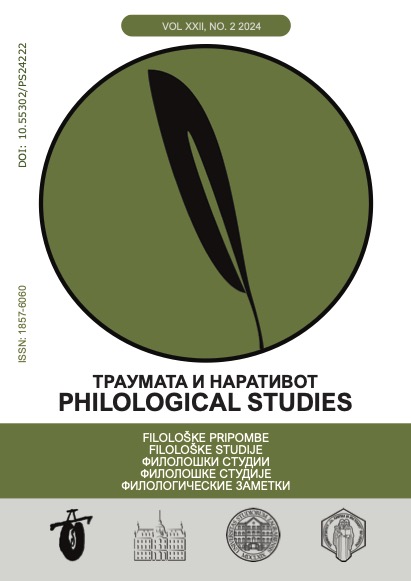IDEOLOGEMES IN KOCHO RACIN’S SHORT STORIES
Keywords:
significance of the literary work, idea, ideologeme, short story, RacinAbstract
The paper tackles the problem of the meaning and interpretation of Racin’s short stories, considering the ideologemes presented in these texts. The points of departure in this analysis are the theoretical approaches to a literary text understood as an ideological act and viewedfrom a hermeneutic perspective, and the one on the theory of reception, which enables the overview of the semiotic relations between the type (seen as a genre of certain text) and the implication, involving the denotation and connotation. These reflections are followed by elaborations on the ideologeme, as presented in the works of Hegel, Pavel Medvedev, Mikhail Bakhtin, Julia Kristeva, and Fredric Jameson. They carefully consider this notion and the correlation between the circumstances in which one text appears and the broader culture, the way they communicate and influence each other. Through meticulous analysis, we differentiate five dominant ideologemes in Racin’s short stories: the awareness, rock breaker, tobacco, city, and jail as means by which the semiosis in the text is being induced. Considering Racin’s reflections on how art should represent reality, it can be inferred that ideologemes in Racin’s short stories serve as discrete signals for social dynamics, imbued with semantic power and undeniable clarity. They become an indicator of his skillful artistic manner, which is not undermined by the success of his poetry and his widely recognized poetic gift.
Downloads
References
Андоновски, Венко. (2007). „Идеологема“, во Поимник на книжевната теорија, К. Ќулавкова (ур). Скопје: МАНУ, 191 – 193. [Andonovski, Venko. (2007). “Ideologema”, in Poimnik na kniževnata teorija, Ḱ. Ḱulavkova (ed). Skopje: MANU, 191 – 193].
Галогажа, Стеван. (1987). „Господинот Мијо“, во Кочо Солев Рацин, Сеќавања на современиците, П. Коробар (ур). Скопје: Наша книга, 38–39. [Galogaža, Stevan. (1987). “Gospodinot Mijo”, in Kočo Solev Racin, Seḱavanja na sovremenicite, P. Korobar (ed). Skopje: Naša kniga, 38–39].
Еко, Умберто. (2011). Читателот во фабула. Превод: Марија Грација Цветковска. Скопје: Култура. [Eko, Umberto. (2011). Čitatelot vo fabula. Prevod: Marija Gracija Cvetkovska. Skopje: Kultura].
Митрев, Димитар. (1987). Коста Рацин, во Кочо Солев Рацин, Македонската литературна наука за Раџин, Т. Тодоровски (ур). Скопје: Наша книга, 118–137. [Mitrev, Dimitar. (1987). “Kosta Racin”, in Kočo Solev Racin. Makedonskata literaturna nauka za Racin, T. Todorovski (ed). Skopje: Naša kniga, 118–137].
Наневски, Душко. (1987). „Рациновата поетика“, во Кочо Солев Рацин, Македонската литературна наука за Раџин, Т. Тодоровски (ур). Скопје: Наша книга, 143–148. [Nanevski, Duško. (1987). “Racinovata poetika”, in Kočo Solev Racin, Makedonskata literaturna nauka za Racin, T. Todorovski (ed). Skopje: Naša kniga, 143–148].
Солев, Димитар. (1987). „За прозата на Рацина“, во Прилози за животот и делото на Рацин, Т. Тодоровски (ур). Скопје: Наша книга, 268–276. [Solev, Dimitar. (1987). “Za prozata na Racina”, in Prilozi za životot i deloto na Racin, T. Todorovski (ur). Skopje: Naša kniga, 268–276].
Тасевска Хаџи-Бошкова, Искра. (Ур.). (2024). Кочо Рацин, Проза и публицистика, том 2. Скопје: МАНУ. [Tasevska Hadži-Boškova, Iskra. (Ur.). (2024). Kočo Racin, Proza i publicistika, tom 2. Skopje: MANU].
Тоциновски, Васил. (1987). „Предговор“, во Кочо Солев Рацин, Проза и публицистика, Т. Тодоровски (ур). Скопје: Наша книга, 7–23. [Tocinovski, Vasil. (1987). Predgovor, in Kočo Solev Racin, Proza i publicistika, T. Todorovski (ur). Skopje, Naša kniga, 7–23].
Bahtin, Mihail. (Vološinov, V. N.). (1980). Marksizam i filozofija jezika. Prevod: Radovan Matijašević. Beograd: Nolit.
Bahtin, M. M. (2000). Problemi poetike Dostojevskog. Prevod: Milica Nikolić. Beograd: Nolit.
Barthes, Roland. (2002). S/Z. Translated by Richard Miller. United Kingdom: Blackwell Publishing.
Deleuze, Gilles and Guattari, Felix. (1983). Anti-Oedipus (Capitalism and Schizophrenia). Minneapolis: University of Minnesota Press.
Hegel, G. W. F. (1975). Aesthetics, Lectures on Fine Art, vol. 1. Translated by T. M. Knox. Oxford: Clarendon Press.
Hirš, E. D. (1983). Načela tumačenja. Prevod: Tihomir Vučković. Beograd: Nolit.
Jameson, Fredric. (2009). The Political Unconscious. London and New York: Routledge.
Kristeva, Julia. (1980). “The Bounded Text”, in Desire in Language (A Semiotic Approach to Literature and Art), L. S. Roudiez (ed). New York: Columbia University Press, 36 – 63.
Medvedev, Pavel. (1976). Formalni metod u nauci o književnosti. Prevod: Đorđije Vuković. Beograd: Nolit.
Solar, Milivoj. (1985). „Teorija novele“, u Književni rodovi i vrste – teorija i istorija 1, M. Šutić (ur.). Beograd: Rad, 37–83.
Downloads
Published
Issue
Section
License
Copyright (c) 2025 Iskra Tasevska Hadji Boshkova

This work is licensed under a Creative Commons Attribution-NonCommercial-NoDerivatives 4.0 International License.
Philological studies © 2019. This work is licensed under a Creative Commons Attribution-Noncommercial-No Derivative Works 3.0 Unported License


